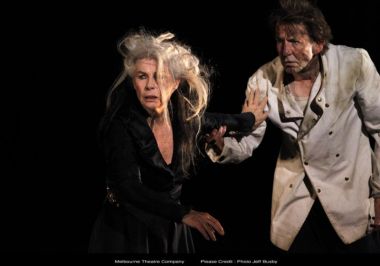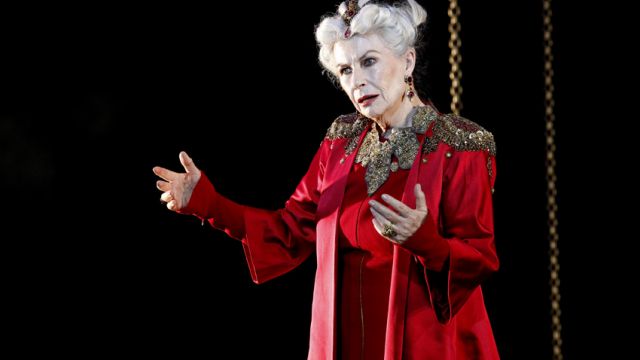Queen Lear
It is a sensational idea to re-cast King Lear from the perspective of a Queen and to put the formidable Robyn Nevin in the lead role. Nevin’s pose on the production poster, complete with mane of hair and those expressive eye shining with rage, wisdom and grief promises a rich and fearless theatrical experience. Indeed, her first appearance on the stage is electrifying, as she steps forth in a bejewelled red gown with coiffured white and black hair. Chains slither to the stage floor before her like serpents in her lair, as she prepares to put her three daughters to a ‘love test’. Whichever daughter puts on the most elaborate, showy display of love for their mum, will be rewarded with a generous portion of mum’s kingdom.
Director Rachel McDonald has found her perfect Lear and that’s why it’s strange that the production overall is so unsatisfying. It is a three-hour show that quickly becomes plodding, weighed down by jaw-aching dialogue and impossibly complex plots and sub-plots.
McDonald has talked publicly about tapping into the ‘Cinderella’ elements of Lear, with two scheming sisters, Goneril (played by Genevieve Picot) and Regan (Belinda McClory). There's an evil mother, and a good third sister, Cordelia (Alexandra Schepisi), Lear’s youngest daughter. The opening scene in which Queen Lear begins her contest has the look and feel of a delicious fairytale. Nevin makes wicked fun of her first lines, when she announces plans to offload her regal duties on her daughters and "crawl toward death". But retirement is not going to be quite the experience she expects.
 The problem is that the Cinderella story is so much easier to follow than this incredibly complex play by Shakespeare. With Cinderella, we immediately side with the good girl and hope her fairy godmother can arrange for her to win over the Prince. In Lear’s world, things are way more complicated. Shakespeare's text has so much to say on so many levels. In this production, that gets lost. We don't know what Lear and Cordelia's relationship was like before that first scene. It's hard to understand why Lear throws Cordelia out. How does she justify that? This production is missing something fundamental to give it meaning.
The problem is that the Cinderella story is so much easier to follow than this incredibly complex play by Shakespeare. With Cinderella, we immediately side with the good girl and hope her fairy godmother can arrange for her to win over the Prince. In Lear’s world, things are way more complicated. Shakespeare's text has so much to say on so many levels. In this production, that gets lost. We don't know what Lear and Cordelia's relationship was like before that first scene. It's hard to understand why Lear throws Cordelia out. How does she justify that? This production is missing something fundamental to give it meaning.
The dialogue is incredibly heavy; characters are constantly moving in and out of scenes; traps are laid; letters change hands. But what is driving all of this? There’s a parallel narrative involving another parent figure, Gloucester (Richard Piper) and his scheming illegitimate son, Edmund (David Paterson) and more favored son Edgar (Rohan Nichol). Then there are the two husbands of the older sisters, Cornwall (Nicholas Hammond) and Albany (Greg Stone). There is also Lear's friend, Kent (Robert Menzies), who is one of the play's voices of reason.
This Lear is hard work to keep up with. You can almost hear the audience straining, as one, to follow it. Many of the actors seem to be in one gear. They deliver their lines in strong, clear voices but there's not much depth to the characters. There were some sound issues on opening night. To this reviewer, Nevin's key scene during the storm was inaudible. I could hear her speaking but couldn't make out the actual words. The thunder and lightning effects were distracting. This wiped out a big part of the play.
The strong presence of Nevin, and Richard Piper, as Gloucester, keep the play alive. Piper is affecting as the unfortunate Gloucester, who gets his eyes gouged out in the second half of the play. This bloody scene at least brought about a change in the atmosphere. Piper was brilliant at making the transition from a powerful man to a blinded, helpless one. The scene where he walks towards a cliff with his exiled son, Edgar, and talks about wanting to jump off was a highlight.
Despite Nevin and Piper's powerful performances, a talented cast all capable of great things, and striking set design (slinky chains, Ottoman Empire temple decor, and barbed wire), this Lear is likely to frustrate audiences. It should work, but it doesn't.
Sara Bannister
Images: Robyn Nevin & Robyn Nevin and Robert Menzies. Photographer: Jeff Busby
Subscribe to our E-Newsletter, buy our latest print edition or find a Performing Arts book at Book Nook.

